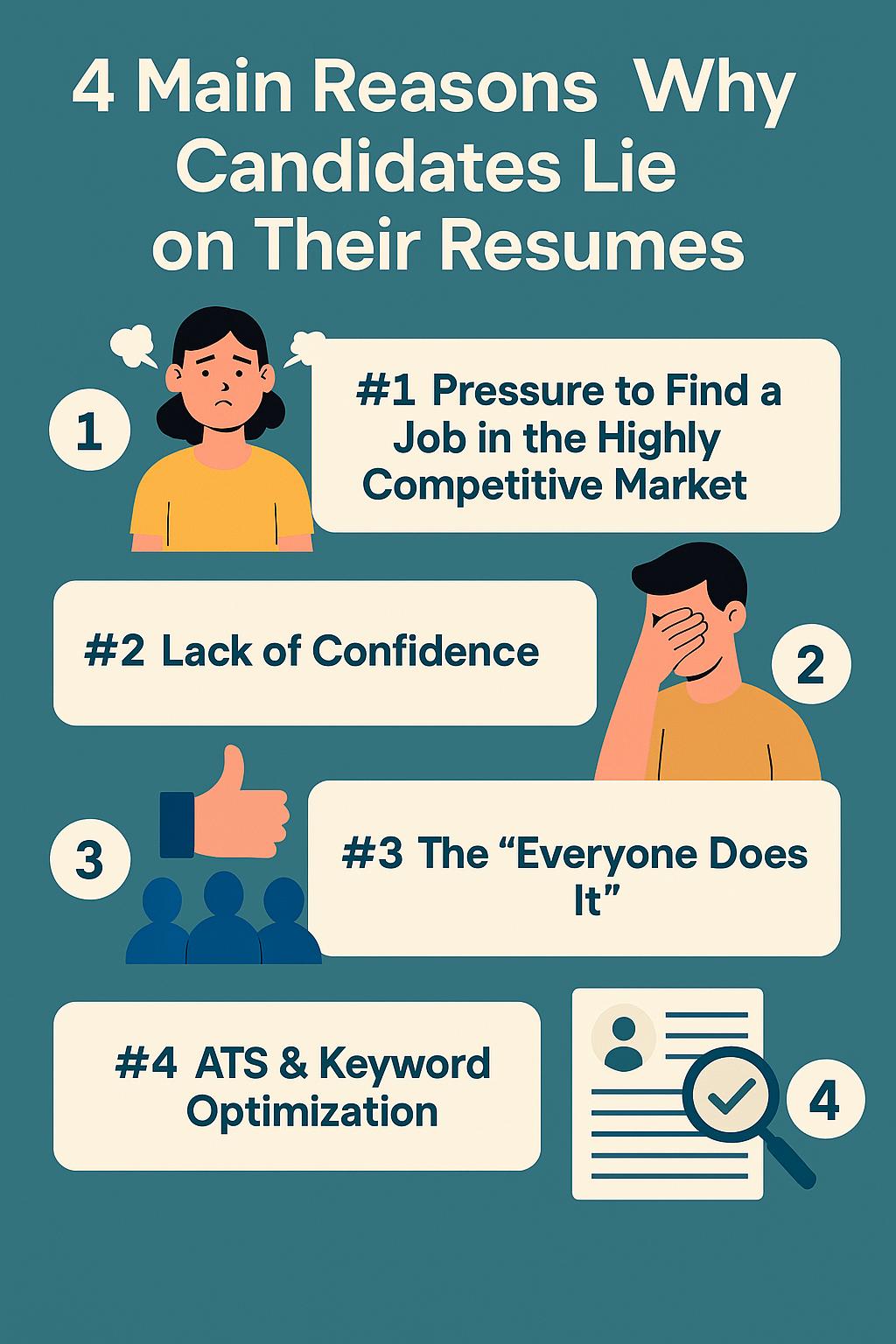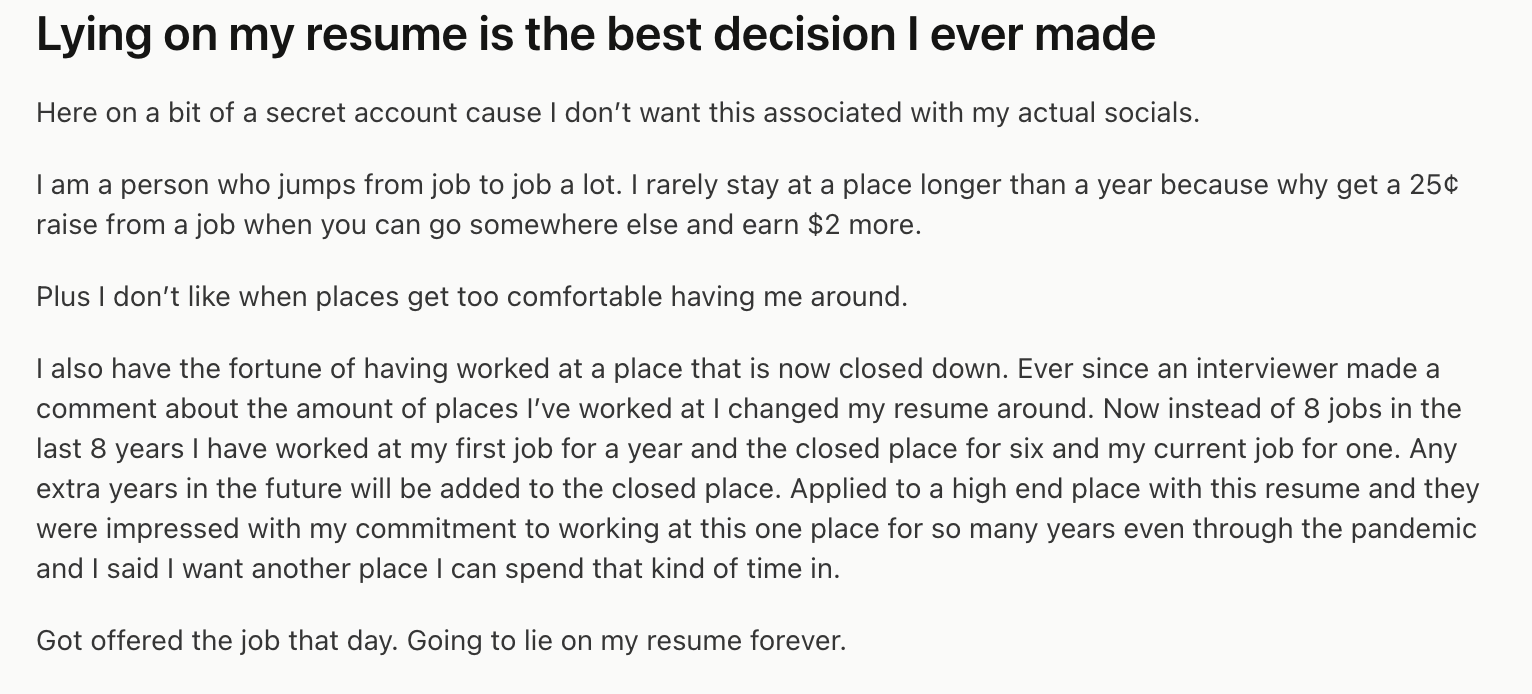Here is the truth: 70% of all job seekers lie at some point in their careers - on a resume, in a cover letter, or during an interview. And there are plenty of people in this world who continue to have great careers despite small fibs on their resumes. Smartening up your CV with a few untruths might seem okay, and you might not even get caught, but it is unethical and a huge breach of trust between you and your potential employer. In this article, we will point out some of the reasons why you may wish to err on the side of truth, as well as the importance of maintaining trust in the hiring process.
To lie on a resume might seem like a harmless way to boost your chances, but it can have serious and lasting consequences. Whether you add untrue information about your experience, stretch job titles, or list skills you don’t actually have, resume lies are more common than you’d think - and employers are catching on. These days, hiring managers are quick to verify what you claim, and a small exaggeration can cost you the job or damage your reputation long-term.
2025 is bringing another hurdle for hiring managers and jobseekers - AI-powered assessment cheating and fake job candidates. Applicants now use AI tools to complete skill assessments or answer technical screening questions during the hiring process, passing off the responses as their own. But companies are catching up; they’re adding follow-up interviews, real-time video monitoring, screen tracking, and AI-empowered flagging tools to detect AI-generated answers. Platforms like Codility, HackerRank, and plagiarism checkers are being employed as well. And even if you make it past the initial round, there’s a high risk of being flagged when your actual abilities don’t match what your resume or test results claim in an interview or during the probation period. Even a simple "How did you do it?" follow-up question can trip a lying candidate.
With the hiring process becoming increasingly tech-driven and great jobs becoming harder to find, resume lies come with an even greater risk.
What is Considered a Lie on a Resume
There are two most common types of lies that candidates use on their resumes: lies of omission and lies of commission. Either of these is bad, and being caught in it definitely does not get you hired. But some lies are worse than others, so let's delve into it.
Lies of omission include facts that you might remove or not mention on your resume, application documents, or questionnaire for fear that telling the truth will prevent your candidacy from being considered for the role. Examples are many: not mentioning having a criminal record or skipping that you never obtained a degree. Lies of commission, on the other hand, include inflated skills, falsified positions, language proficiencies you don't possess, or academic credentials you never had.
Here is a list of the most common resume lies:
1️⃣ Untrue job titles - when "Assistant" becomes "Manager"
2️⃣ Fake proficiency in tools or software - saying you have expert-level knowledge of Excel, Salesforce, or AI tools you really don't
3️⃣ Exaggerated achievements - adding unverified metrics like "increased sales by 300%"
4️⃣ Hazy employment timeline - adjusting employment dates to cover employment gaps or appear more experienced
5️⃣ Fake degrees or certifications - listing diplomas or courses never completed or from non-existent institutions
6️⃣ Untrue soft skills - adding traits like "bilingual" or claiming foreign language proficiency you don't really know
7️⃣ Fake references - providing friends or your own email addresses posing as professional references
8️⃣ Delisting short-term jobs or gigs - leaving out freelance work, contract roles, or jobs that didn’t go well
9️⃣ AI help in completing skills assessments - using chatGPT or other LLMs to solve test assignments
Even when you don't intend to lie on your resume, you can still unintentionally do so by utilizing AI to write your resume. How can this happen, you might ask? Easy! AI has become an invaluable tool for resume writing, and yet we must remember that all it does is scour the thousands of resumes it finds online and create yours out of the information it seeks from them. This means that it can use synonyms for position names that are interchangeable for AI but have a very specific distinction for a recruiter. AI can also add common tools and certifications that, in its opinion, anyone writing a resume for a particular industry should have. And if you are not attentive enough or don't proofread your resume - you might get accused of lying. For AI, verbs like leading, managing, and assisting with can all mean the same thing, while the recruiter reads into the description differently. For example:
Original description:
- Assisted in the development of a marketing campaign for a regional product launch.
AI-reworded description:
- Spearheaded the strategic development and execution of a national marketing campaign, resulting in a successful product launch.
How this happened and why it is misleading:
- "Assisted" becomes "Spearheaded," implying leadership and full ownership. AI thinks these are synonyms, but the hiring manager imagines completely different outcomes.
- "Regional" becomes "National," which exaggerates the scope and reach.
- The "resulting in a successful product launch" part suggests direct responsibility for the campaign's success, which wasn’t in the original input.
The bottom line is that it is not bad to use AI-powered resume builders to fix your resume, but you should always double-check, edit, and make sure the information provided 100% reflects your tasks and achievements.
Why People Lie on Their Resumes

With all the risks involved, people still lie. Good people and qualified candidates turn to embellishing or outright faking their resumes in a desperate bid for a job. There are a few reasons for that.
#1 Pressure to find a job in the highly competitive market
Job search is evolving so much faster now than it did in the past decade. The advancement of AI makes entire professions and even industries obsolete. Millions of job seekers are either unemployed or at a higher risk of losing their jobs, which makes it even more difficult to land a lucrative role. Hence, making your resume more attractive to recruiters by adding a few untruths. Of course, the employers are not entirely blameless. In many instances, the requirements, even for entry-level jobs, are unrealistic, and the pay is very low. Companies should really reevaluate their hiring policies, non-negotiables (like degrees or years of experience), and base pay.
#2 Lack of confidence
Speaking about unrealistic expectations, many candidates feel like their real-life experiences and level of skills do not measure up to what recruiters are looking for. Reading through the job descriptions posted on LinkedIn or Glassdoor, people feel compelled to measure up by adding some of the responsibilities they never held or fictionalizing online courses they took. Another reason might be impostor syndrome, especially if you are a woman trying to build a career (some 70% of women experience impostor syndrome at some point in their careers).
#3 The "Everyone Does It"
If you google "is lying on a resume illegal?" you will be flooded with Reddit feeds with people describing the most ludicrous lies on their resumes and how they got away with them. Some reason that they are "leveling the playing field," others - that they were desperate for a job, and yet others - that they have all the required qualifications and just added some stuff to make themselves more sellable. Here is a perfect example:

This mindset can lead to small exaggerations that snowball into full-blown lies. And even if it seems harmless, employers are increasingly verifying details, and the risk of getting caught is real. Also, let's not forget that this lie probably had another unintentional victim - the honest job seeker who did not embellish their resume and lost out to the candidate who did (and potentially jumped the job again after a few months).
#4 ATS & keyword optimization
Many articles and resume writing services scare job seekers with their worst enemy - ATS. Applicant Tracking System is a software that recruiters and corporations employ to help sort through hundreds of applications they receive. It has become something of an urban legend and the ever-elusive cryptid of the job search process - no one has a clear understanding of how it works, but everyone thinks that it is the reason they don't get hired. And yet, ATS is simply doing just what we described in the first sentence - it sorts through applications, most often by the date of being received, and organizes all the resumes into a searchable database.
In the desire to "beat the ATS," candidates tend to stuff their resumes with keywords they found in the job description, hoping to get past it. While this can be a smart tactic when done right, overdoing it or using misleading terms creates a resume that doesn’t reflect actual experience, especially if you list tools or apps you only briefly (or even never) encountered just to match a job post. Recruiters are aware of this trend and often dig deeper when a resume reads too perfectly aligned with a posting.
Consequences of Lying on a Resume
There are a few ways recruiters can catch you in a lie. A few of the most often used are:
✅ Background checks
✅ References verification
✅ Social media comparison
✅ Live skill assessment
✅ Behavioral tests during interviews
And the larger and more successful the company you are applying to is, the more resources they have to run all these checks and verify your information.
Once caught, here are the ramifications you can suffer.
❌ Rescinded job offer
If you think your lies were bought and you got a job offer - think again. Many companies, as a rule, have a final background check either after extending the job offer, right after onboarding, or even in the first few months of your probation period. You might be asked to bring your college transcript, show your proficiency in the tool you listed in your Computer Skills section, or be invited to lunch by the employees who speak the language you claimed you speak. Even minor inconsistencies can be a breach of trust and reason enough for termination.
❌ Reputation damage
People talk, and industries are getting more and more interconnected. Also, recruiters might switch companies or share notes on the candidates. It's that simple. There might not be a national blacklist of job seekers, but most companies definitely maintain their own. Some companies go as far as barring candidates from applying to the same company again after being rejected for at least a year. And that is just because they were not shortlisted for a role. Imagine what these companies will do with an applicant caught in a lie.
❌ Legal Implications (in some industries)
If you are lying on a federal resume or academic CV or when applying for a role in healthcare or law enforcement, the ramifications might be more than the rescinded job offer or termination. In high-trust sectors like the ones we mentioned, it can be downright illegal, especially if you are lying about criminal records, licensing, certifications, or security clearances. Employers in these sectors are also more likely to verify every credential and audit internal records periodically. A fake degree, expired license, or fabricated job history can come to light years later — and have serious consequences.
What to Do if You Already Lied on Your Resume
First of all, don't panic and stay calm. If you are far along in the recruitment process (i.e., interview), a simple "I updated my resume too fast and didn't pay attention to this inconsistency" can be all it takes to fix the situation. Recruiters are people, too, and if they liked you and shortlisted you, they might not want to go back to point A and start from scratch.
Here is a checklist of other actions you should take to correct the fib:
✅ Update your resume immediately - Remove all false claims and replace them with accurate descriptions of your experience and capabilities.
✅ Be proactive if you’re mid-application - Send an updated version with a brief, non-defensive note: “I realized an error on the resume I submitted and wanted to make sure you had the most accurate version.”
✅ If questioned in an interview, be honest - Don’t double down. Acknowledge the mistake, keep your explanation short, and redirect to what you can truly bring to the role. Example: “I updated my resume too quickly and included something that wasn’t fully accurate. I’ve since corrected it, and I’d love to focus on how my actual experience aligns with this role.”
✅ Consider professional help - If you're unsure how to present your experience honestly and still stand out, let us help. As a consistently voted best resume writing service, Resumeble knows how to highlight what matters to recruiters.
What to Do Instead of Lying
If you are unsure about your resume or think it might need to be improved, here is what you can do.
First, create a master file or a resume outline and use it to customize your resume to each position. In this employment climate, you need hyper-personalized applications to make sure you are the best fit for the role. If even five years ago recruiters were expecting 60-70% fit for the role, nowadays even 90% might not be enough. And if you are sure you are the perfect fit, make sure your resume reflects that.
If you have large career gaps, consider using a hybrid resume format instead of a more popular chronological one. Do not lie about your employment dates; instead, shift the focus of your resume to your skills and accomplishments.
Leverage volunteering and personal projects to showcase your abilities if they are lacking from your professional experience.
Use cover letter writing to explain any inconsistencies or things that might need you to elaborate on. When used wisely and strategically, a cover letter can become an invaluable tool in your road to a dream job.
Pepper those keywords naturally throughout your resume, especially the professional experience section. Do not create a separate section and stuff it with dozens of industry resume buzzwords; instead, prove your abilities via measurable data (also, truthful!) and strategic usage of resume action verbs for maximum impact.
FAQs
A: No, if you lie on a resume in the US, you are not breaking the law. It is up to the company hiring you to check your resume, run due diligence checks, and research your background to see if you are telling the truth. For example, you can say you are the best brain surgeon in the country when you are not even a surgeon, and you will not be prosecuted (or sued). However, if you try to prove your lie by providing fake licensing or certifications, then you are breaking the law.
A: Some of the most common lies found on resumes are fake job titles, exaggerated responsibilities, and fake or inflated achievements. Candidates also often lie about education, certifications, and technical skills they don't actually have.
A: Companies can reach out to your past employers and ask questions about your time there. They will also most likely google you or check your LinkedIn and other available social media. This is often done to evaluate the culture fit, but a trained recruiter's eye will definitely spot any issues or misaligned career timelines, which tends to be one of the most common issues in a battle of LinkedIn accounts vs. resumes. There are also live assessment tests where you will be locked out of AI tools to help you code or answer a technical question.
A: Nothing might happen. Or everything. If you work for a small company and have been with them for a long time, and the lie is not too big, there might be a trust loss, and that's it. But don't be surprised if you are getting funny looks during the next company get-together. More often than not, though, you will lose your job, and if you lie in a high-trust position (i.e., government, healthcare, or law enforcement), it can result in fines, legal actions, and even prosecution.
A: Lie is rarely justified, and even more importantly, it is very difficult to keep up with it. It is just not worth it - to damage your credibility and potentially ruin your reputation in your industry by adding a few extra tools or murking up your employment dates. Own your career history and tell it with a powerful, impactful, and truthful resume. And if putting "Advanced Excel skills" is so important to you, you can always take a free course or ask a friend to teach you :)
Final Thought: Honesty Always Wins
Resume lies create unnecessary pressure as you have to keep the story straight, sometimes for years. The trust between you and a potential employer is fragile, and even one uncovered lie can break it instantly. Instead of risking it, focus on showcasing your real abilities and qualifications. There's no need to add untrue information when you can frame your genuine experience to shine.
